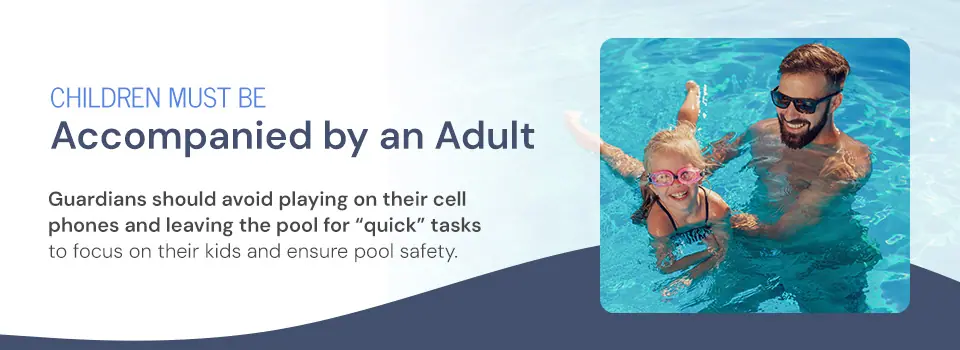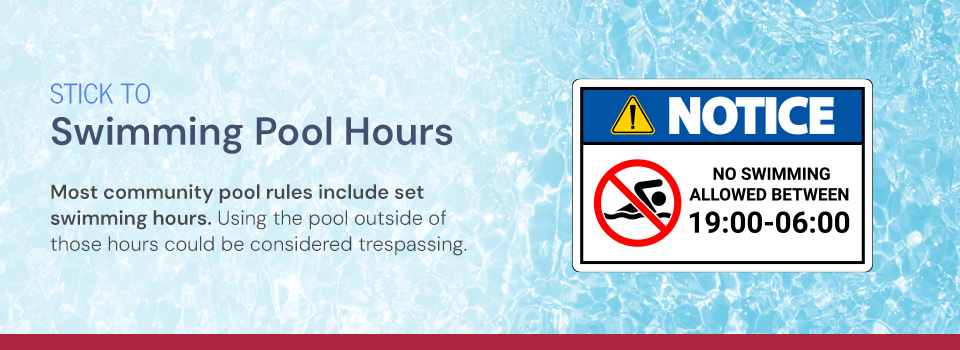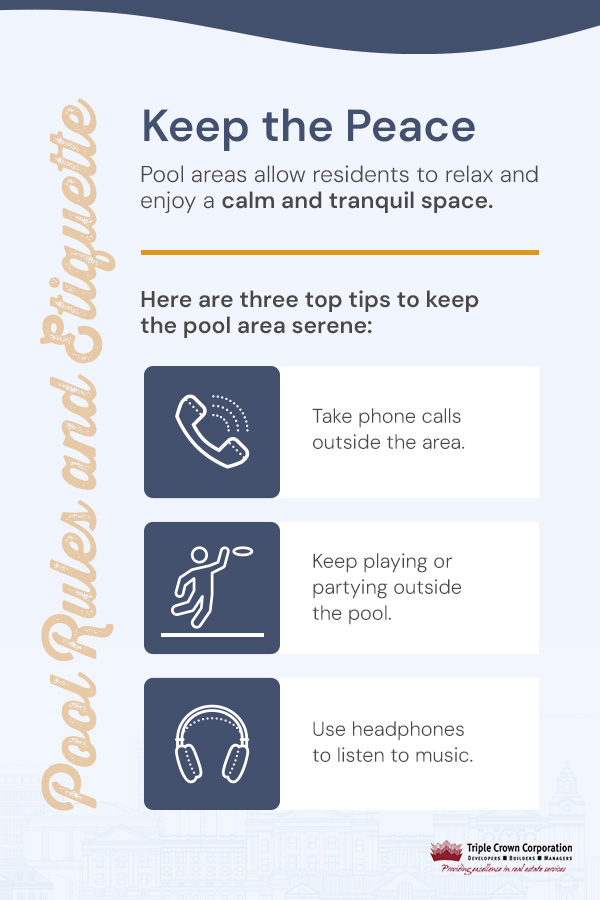

Apartment swimming pools provide a fun space where residents can socialize with one another and escape the heat. Understanding your community’s rules and following unspoken pool etiquette is key to having the best time and ensuring you are considerate of those around you.
A few simple rules make enjoying the facilities more fun for everyone and create a culture of safety and thoughtfulness.
Community rules ensure that all residents can enjoy the pool. They also protect the privacy and safety of other occupants. As long as you follow the established regulations, you can make the most of your pool access.
Here are some typical swimming pool rules for apartments that all residents should follow.
Smoking near the pool can pose a risk to other residents, including nearby children. Cigarette smoke can also cause respiratory issues in individuals with preexisting conditions like asthma.
Drugs and alcohol impair judgment and increase the risk of accidents, which could cause injury to you and other pool members.
Jogging around the pool may seem fun, but it can be slippery and cause falls. Pool visitors can stay safer by avoiding horseplay and activity on the slick concrete.
Kids should be aware of the dangers of running or playing recklessly around the pool. Individuals should also refrain from intentionally or unintentionally pushing others into the water.
An apartment with a splash pad can offer children a safe space to play with more freedom while posing fewer risks around the swimming pool.

Water-related accidents can happen in the blink of an eye, especially with children or non-swimmers. Management usually implements apartment pool rules that require children to be supervised by adults to reduce the chances of mishaps. It ensures that there’s always immediate assistance from a reliable person in an emergency.
The American Academy of Pediatrics (AAP) recommends guardians of children under age five be an arm’s length away from their kids. This rule prevents parents from getting distracted at the pool or being too far from their children to act in an emergency.
Guardians should avoid playing on their cell phones and leaving the pool for “quick” tasks to focus on their kids and ensure pool safety.
While pet-friendly apartments are a welcoming option for animal lovers, that doesn’t mean our furry friends can take a dip in the shared pool.
Getting pets involved in water activities can be fun, but shared pool areas aren’t the ideal space for that. Some of your neighbors could have pet allergies. Pets can also become scared or overly excited in a loud, noisy pool with strangers. This environment isn’t ideal for your dog, who could act unexpectedly.
No glass is one of the most common pool rules for apartments. Glass breaks easily and can be very challenging to find and remove from swimming pools. Shards can damage pool liners and pose a threat to swimmers.
Apartment communities can preserve the safety of residents by prohibiting glass from the pool area. Rigid plastics and other breakable items should also be kept away.
Hygiene is essential for all individuals who wish to enjoy the shared swimming area. Shower before and after a swim. This step prevents dirt from your body from getting into the water or other shared areas like lounge chairs. Showering afterward also prevents germs from staying on your skin and removes chlorine, which could cause dryness.
Use the bathroom facilities before going to the swimming area. Always avoid urinating in the shared pool. Urine and chlorine can cause eye redness and stinging, which may cause symptoms that affect health.
Ensure suntan lotions are absorbed into the skin before swimming to prevent the greasy residue from sitting on the water and pool walls.
People shouldn’t swim when they’re sick or have open wounds. Bandages also have no place in the pool. They can introduce an infection to a wound or come off in the water and disrupt swimmers. If you have a cut or scrape, wait until it is fully healed to use the amenities.
Apartment pools are designed with residents in mind and intentionally provide a space for neighbors to come together and have a good time. While most communities allow you to bring guests to the pool, it’s important not to share the access code or pool key with them.
Sharing the access code with non-residents could lead to guests using the area when you’re not around, and you may be held liable if they cause any damage. You should also look out for non-residents who may try to gain entry to the pool when you open the door. Only open the door for your guests or yourself. Those who are taking advantage of your community’s pool may not know or abide by the rules, which can create potential issues.
Proper swimming attire keeps you safe in the water and improves movement. It also maintains a level of appropriateness that shows your consideration for other residents who also want to enjoy the pool area.
Consult with your community’s pool rules regarding attire before choosing your swimsuit — they may have specific rules to ensure a family-friendly setting. Children likely need to wear appropriate swimming aids, like floaties or life vests. Babies must be in water-resistant diapers and swimmers to prevent excretions from entering the water, and guardians should regularly check their bottoms to ensure they’re clean before and during pool time.

Most community pool rules include set swimming hours. Using the pool outside of those hours could be considered trespassing. It might seem like the pool hours are unnecessary, but they serve several purposes:
Apartment pool etiquette is about ensuring your actions don’t disturb others around you. While there are usually no hard and fast rules around it, you may not be invited to the neighborhood cookout if you don’t follow these tips.
Sharing the pool with other swimmers can be fun, but it could also become bothersome if residents don’t follow a few unspoken rules. Here are some top swim etiquette tips:
If you see a towel or belonging on a pool chair, another resident has claimed it. You should use another chair to place your belongings. Sometimes, the pool is busy, and you may need to share. Find the person whose belongings are on the chair and ask if you could leave your stuff next to theirs. Following this unspoken rule can help avoid conflict between residents.
While the towel rule is assumed, some people may abuse it by claiming chairs they don’t plan on using. This practice prevents others from enjoying the area and creates conflict. Residents should alert security or the community management of such practices. Only claim a chair at the time you plan on using it or being at the pool. Refrain from doing it hours before or after you plan on using the area.
As you enjoy the cool water, avoid splashing those around you, especially individuals lounging poolside. Be conscious of those nearby and don’t kick aggressively while swimming close to the surface. If you are in charge of any kids, ensure they do not splash unnecessarily as they play and swim.
Remember that a few splashes may be inevitable when visiting the pool. Protect any electronics, such as your cell phone, e-reader and headphones from water damage.
While sunscreen application is key to making the most of your pool day, always be mindful of how these products can impact others at the pool.
For example, don’t allow your spray sunscreen to blow over the people lying in chairs nearby. If you’re using tanning oil, thoroughly wipe down the chair after use to remove any slimy residue. Be careful about the products you use near the pool, especially those that can leave the concrete or pool furniture feeling slick or sticky.

The main purpose of community pool etiquette is to keep the place peaceful. Pool areas allow residents to relax and enjoy a calm and tranquil space. Here are three top tips to keep the pool area serene:
Some apartments with stunning saltwater pools and sundecks offer a photo opportunity you can’t turn away from. While management rarely has issues with residents snapping pictures in the pool area, others may not be happy if they are featured in the background.
Always ask for permission first if you are taking a picture and inform others who may be in the shot so they can decide if they want to be in it. You should also be wary if there are children in the background. It’s best to snap a picture of a different spot in the pool without any residents.
Most shared pools don’t allow inflatable floats and loungers because they take up too much space and can interfere with other people in the water. Other swimming gear, like pool noodles and kickboards, can also be an annoyance.
If a person is still learning how to swim and requires the equipment, they should gain permission first. They should also try to access the area during quiet times so they can use more space without disturbing others.
Hand paddles and training fins may be necessary for children practicing their strokes and kicks. Those using these types of swimming gear should stick to the slow lane and steer clear of areas with other swimmers.
While there may be a lifeguard and other residents present at the pool who can assist you if you need help, it’s best to know your limits. If you feel unwell, don’t enter the pool area. If you get sick while visiting, promptly remove yourself and head home.
Avoid swimming on a full or empty stomach, as this could make you feel sick. If you don’t know how to swim, it’s best not to enter the water and stay away from the pool’s edges.
Don’t overestimate your capabilities. Take care of yourself, and always keep an eye on those around you to ensure the safety of your community.
Are you interested in finding an apartment or townhome that has a pool to catch a few rays and make the most of the warmer summer months? Triple Crown Corporation has rental communities throughout Central Pennsylvania with excellent amenities, including pools, clubhouses and splash pads. We have been helping people find their dream homes since 1977.
Schedule a tour with us, and we’ll help you discover a place to call home. You can also check out our residential communities online to see what we have to offer.